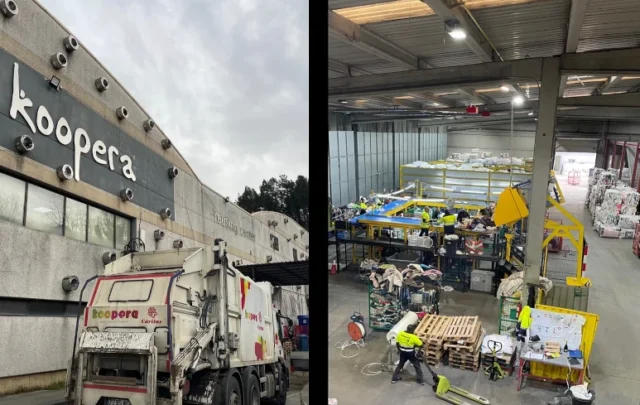Crown shyness is a phenomenon where the crowns of fully stocked trees do not touch each other, forming a canopy with channel-like gaps. The immediate thought that came to mind is that this is what a community of practice feels like — growing together, leaning on one another in the wind, while forming a microclimate of new patterns and flows that wouldn’t have existed otherwise.
Over the past years I’ve participated in a number of communities of practice across different (sometimes wildly different) domains of practice. I’ve also written before about the need for communities of practice and mused about how we might redesign the Climate COP (conference of parties) as a CoP (community of practice). Here I’m sharing some insights from my PhD inquiry which centres around the role of systems approaches to cultivate and support communities of practice within the field of urban resilience. It draws on an action research methodology, where the primary inquiry ground has been the BLOXHUB Urban Resilience Summer School (2019 and 2020 editions). But let’s start at the beginning.
What are communities of practice?
Lave and Wenger’s early work on communities of practice (Lave and Wenger, 1991) emerged from observing people going about their day to day work, how they dealt with everyday challenges, solved problems and how they onboarded newcomers in their teams and workplaces. Their field research led to the emergence of a body of theory on the role of social learning (predominantly within formal organisations such as companies or within formal professions such as midwifery).
The concept ‘community of practice’ is underpinned by an assumption that learning is a social process rather than a passive act of knowledge transfer between a knowledge giver (usually a master, expert or teacher) and a knowledge receiver (usually an apprentice, a novice or student). Understanding learning as a relational process means we acknowledge the bidirectional flow and the interchangeability of the ‘giver’ and ‘receiver’ roles. It also means that the strength and depth of relationship(s) within the learning pair or group is reflected in the quality of learning taking place.
Three key components of a community of practice:
- The domain as “an identity defined by a shared domain of interest. Membership therefore implies a commitment to the domain, and therefore a shared competence that distinguishes members from other people” (Lave and Wenger 1991);
- The community as the pursuit of the community’s “interest in their domain” (op. cit.) and the relational space that leads to trust building — oftentimes through interactions that span the personal and the professional;
- The practice as the “shared repertoire of resources: experiences, stories, tools, ways of addressing recurring problems — in short a shared practice. This takes time and sustained interaction” (op. cit.).
In our case, the boundary definitions of all three components are experimental and somewhat diverging from the ways in which the concept of CoP has been applied to date. This is both exciting (hey look, we’re doing something new!) and equally terrifying (hey look, as a community steward I’m accountable for this!).
[slide-anything id=’3472166′]
Our domain is the interdisciplinary field of urban resilience, term which I have previously defined as “the adaptive ability of urban communities, institutions and settlements to respond to shocks and stresses through a process of socio-political negotiation between the trade-offs required in imagining and implementing urban interventions” (Angheloiu & Tennant, 2020). Although my own definitional focus emphasises the need to surface the tensions that emerge through the negotiation between trade-offs (whose resilience is prioritised, for when, from what to what?), there is little consensus among scholars, practitioners and policy-makers as to what the field actually stands for. While some (myself included) see urban resilience as having a strong normative component, others argue that urban resilience is the objective, measurable capacity of an urban settlement to adapt and overcome shocks and stressors. In this sense, the definition, scope and boundaries of our domain are all contested.
Secondly, our community emerged as the main outcome from the 2019 Bloxhub Summer School. A cohort of 30 mid-career practitioners, policy makers and researchers joined the Copenhagen-based summer school from 20 countries. In one of our reflection sessions a pattern that emerged was that ‘we feel less lonely’, which speaks to the belonging and identity element of communities. However, continued active engagement is hard to sustain across the different geographies and time zones we’re based in, while achieving the same level of trust across cohorts is harder than when people share a foundational experience together (as participation in the summer school is the process by which ‘newcomers’ join the community of practice).
Thirdly, our practice arguably has nothing (and yet everything) to do with urban resilience. This is perhaps counterintuitive, as an urban resilience CoP would be expected to explore the edges of its domain, however, one of the key insights across both summer schools to date, was that our shared practice is that of learning to think systemically and act from a deeper systemic worldview. Urban resilience is a core shared domain, or our ‘what’ to put it like this, but the key focus of our community is our ‘how’.
And that’s because building systemic literacy is a process of social learning.
In other words, it’s hard to go at it alone; at any point during the process you’ll have only one viewpoint of the system you’re exploring — your own perspective pointing a torch in a specific direction. Having spent a few years scanning, taking part in, as well as designing learning offers around all things systems — systems thinking, systems approaches, systems change, I’ve often seen a core assumption at play: that there are skills, capabilities, tools and methods that you can learn and then apply them to systems. Although this is true (and we sure need so many more people to even feel the need for this), it also creates a trap. It reinforces a positivist worldview — knowledge is ‘out there’ and needs to be ‘discovered’, as well as perpetuating a hero narrative about the role and impact of ‘systems thinkers’. Although it can be argued that this is an important approach that has its place in the wider systems family, to me this doesn’t take into account the relational and co-constructed nature of open systems.
You can map a system all you like, but the map alone won’t tell you what to do next.
We often choose to focus on the tangible artefact (the map, the report), rather than focus our learning objectives on the relational and power dynamics. Many lifelong learning and capacity building programmes are designed and delivered to centre individual learning outcomes, rather than community, or even better, ecosystem learning outcomes. Although if you think back to your own learning experiences you might say the people you met were the best outcome, this is usually by accident, rather than by design.
So what would be different when we design learning experiences that centre communities of practice?
Although my quick answer would be ‘too many things’, I’ve tried to summarise below a few key ingredients and what would success look like:
- Primary focus on relationships and trust building rather than on ‘knowledge transfer’. Obviously content knowledge is key and there needs to be enough ‘meat on the bones’ for people to have a shared language and understanding of the domain they’re situated within. Centring CoPs in this case would mean that the depth and density of relationships is a key KPI — how many collaborations have emerged? How many sub-groups or smaller communities are self-organising? What support do they need to self-facilitate?
- Coaches need coaches too. Keeping the flame alive takes time and energy and CoP stewards and facilitators also need support and nourishment to keep going. For me this has come with other fellow alumni stepping into this role in different ways (hello Monica, Kirsten, Jenna!), as well as external coach buddies (hello Anna, Louise!). However the learning edges of the stewards need to be explicitly acknowledged to maintain the legitimacy to facilitate. Without overinflating the steward role, I think we need to be more explicit about the power and duty of care that comes with it. Here for me a KPI would be whether my role and that of others has shifted as the CoP matures.
- Design for ecosystem learning outcomes. There’s a need to think about the long-term journey of a community (emergent as it is!) and the role of a specific learning experience in the wider domain. In our case, the BLOXHUB Summer School is the core learning experience that introduces newcomers to the CoP. In many ways, it’s less important on its own than it is for building shared norms and expectations for the continued participation in the CoP. In an ideal case, I’d expect the CoP to drive the development priorities in terms of other shared learning experiences that are needed.
- Centre equity in the funding model. This is a big sticking point and experimental ground for me, as many learning offers come with a prohibitive cost. This usually reflects the amount of time, care and creative process that’s required to design and facilitate, while highlighting the lack of core funding to cover this. To centre ecosystem learning outcomes we need more hybrid business models (as well as delivery models) to keep barriers to access low. The quote below really brought it home for me:
“Around 70% of urban adaptation aid is dedicated to “hard” infrastructure while about 10% goes to “soft” measures to support capacity building related to urban infrastructure planning and adaptation.” (Revi et al., 2014)

I started writing this prompted by the ‘crown shyness’ metaphor. In writing this, what emerged for me is that oftentimes our societal obsession with the individual ‘crowns’ as the visible pinnacle of maturity and success, ignores the role of the nourishing soil and mycelium within that makes the crowns possible to begin with.
I’d argue that in order to shift from individual to ecosystem learning in communities of practice we need to focus on both.
I’d like to extend my deep gratitude to the many humans of this shared inquiry (some pictured above), for the formal and informal chats, late nights and early mornings spent beavering together in 2019–2020. Nevertheless, they persisted.
Notes and bibliography
On communities of practice
I’d recommend starting here, but if you want to find out more here’s the key books and texts:
- Situated learning: Legitimate peripheral participation. By Jean Lave & Etienne Wenger, Cambridge University Press, 1991.
- Communities of practice: learning, meaning, and identity. By Etienne Wenger, Cambridge University Press, 1998.
- Learning in landscapes of practice. By Etienne Wenger-Trayner, Mark Fenton O’Creevy, Steven Hutchinson, Chris Kubiak, Beverly Wenger-Trayner, Routledge, 2014.
On urban resilience
There’s a myriad of resources and organisations working in urban resilience. I base most of my insights from this post on an in-depth exploration of the field undertaken during 2018–2020, partly published here:
- Angheloiu, C. and Tennant, M. (2020) ‘Urban futures: Systemic or system changing interventions? A literature review using Meadows’ leverage points as analytical framework’, Cities, 104, p. 102808. doi: 10.1016/j.cities.2020.102808.
On systems approaches
Again, there’s many resources and people who are charting the multidisciplinary fields that feed into the term of ‘systems approaches’, here’s a few of my favourites:
- In too Deep
- The School of System Change
- Systemic action research: A Strategy for Whole System Change. Burns, D., 1 edition. Bristol: Policy Press, 2007.
- Systems Approaches to Managing Change: A Practical Guide, Reynolds, M. and Holwell, S. (eds) Milton Keynes, The Open University in association with Springer-Verlag London Limited, 2010.























